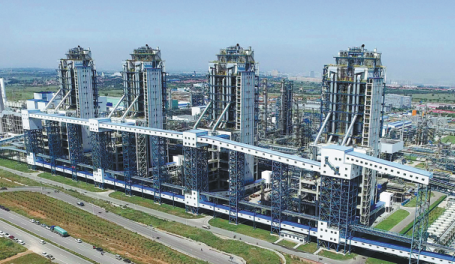Coal companies make strides in green growth
Updated: 2022-08-19

A green production base of a coal company helps to boost the clean energy innovation in Shanxi. [Photo by Cui Kai for China Daily]
Shanxi's energy industry players, especially coal-mining companies, have been given a new lease of life thanks to upgrades driven by digital, intelligent and automated technologies.
The upgrades, targeted to promote clean production and improve efficiency, have brought about both environmental and economic benefits.
Tunlan Coal Mine, a coal mining and coal-fired power-generation company in the city of Gujiao, for instance, is contributing to sustainable development by establishing innovative coal-refuse recycling and reuse projects.
The coal ash from its near-mine power plant is no longer dumped in the vicinity, instead, it is now transported via conveyor belts to its depleted mining shafts for refilling, reaching a depth of up to 400 meters underground.
A company executive said such a practice has multiple benefits in both environmental and economic terms.
He said the project can effectively solve the problem of solid waste discharge and avoid the risk of geological disasters and this is also a practical solution to save on the costs of waste disposal and shaft refilling.
Gengyang New Energy Group, a coking company in the county of Qingxu, is another example of how its upgrades are contributing to environmental improvement.
In March, it pulled down a 55-meter coke wet-quenching tower and replaced it with a more efficient and environmentally friendly facility.
Wet quenching is a traditional cooling technique in coke production, featuring a higher level of carbon dioxide emissions and other pollutants and dust, according to an executive of the company.
He said construction of a more advanced dry-quenching facility will start right away and is scheduled to be completed in April 2023. The new facility is expected to save 120,000 metric tons of water and 21,000 tons of coal a year when it is operational, while reducing 18 tons of hydrogen sulfide and 116 tons of dust.
The coking unit of Jinnan Steel Group, based in the city of Linfen, is another example of upgrading the coking industry with smart technologies.
With the application of digital technologies, the group's coking production is now controlled by an integrated control center.
With such a center, a company executive said the laborious coking process, including coal loading, coking, coke quenching and coke unloading, can be virtually controlled by one person with the push of a button.
Mining and production workers are the ones most pleased with the improvements in efficiency and safety in their workplaces.
Guo Jinchao, a worker in Jinxinda Coal Industry, a branch company of Shanxi Coking Coal Group, had been working in underground mine shafts for many years.
But now he is working in a control center above the ground, skillfully controlling various mining equipment via a remote operational system.
"The system makes automation possible for coal cutting and conveying," Guo said. "The number of laborers for one shift has been reduced from eight to four and the production efficiency has also increased by 50 percent."
The upgrades have brought fundamental changes to Shanxi's energy industry. According to the Shanxi Energy Administration, the province is now home to 22 smart coal mines with 548 smart mining shafts. The majority of Shanxi's coal output, or 75 percent, is now produced by mines with advanced, efficient and clean-production facilities.
While upgrading its coal-mining sector, Shanxi is diversifying its energy industry by developing more clean energy resources like wind and solar power.
The capacity of power-generation plants based on clean and renewable energy resources now accounts for 34.3 percent of Shanxi's total, local statistics show.
Wu Jia contributed to this story.



